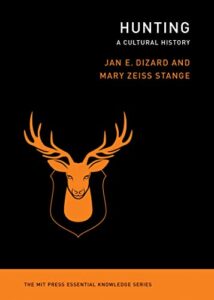 Had I not grown up in a rural American town where hunting was a very common activity among the residents, I doubt I would have ever understood very much about it. Even though my family contained very few hunters (in comparative proportion to those of many of our neighbors), simply living day-to-day, year-in and year-out among so many hunters – of both mammals and birds – was sufficient to acquire an understanding of both the mechanics of the activity, as well as the ethics and psychology of it. It has also enabled me to separate hunting as it has long been practiced in America from the recent attempts by self-serving political and industry PR operatives to manipulate it into a divisively tribal social issue. For me, hunting has never been about gun rights or the National Rifle Association; it has always been a matter of providing food for one’s family, wildlife management, and cultural traditions.
Had I not grown up in a rural American town where hunting was a very common activity among the residents, I doubt I would have ever understood very much about it. Even though my family contained very few hunters (in comparative proportion to those of many of our neighbors), simply living day-to-day, year-in and year-out among so many hunters – of both mammals and birds – was sufficient to acquire an understanding of both the mechanics of the activity, as well as the ethics and psychology of it. It has also enabled me to separate hunting as it has long been practiced in America from the recent attempts by self-serving political and industry PR operatives to manipulate it into a divisively tribal social issue. For me, hunting has never been about gun rights or the National Rifle Association; it has always been a matter of providing food for one’s family, wildlife management, and cultural traditions.
In regard to this last point, I was initially surprised and then, upon further enquiry, pleased to learn about a new addition to the Essential Knowledge series published by MIT Press: Hunting; A Cultural History by Prof. Jan E. Dizard and Prof. (Emerita) Mary Zeiss Stange. Following the Zeitgeist of the series, the authors go deep into the history of their subject, beginning with an examination of hunting as practiced by early humans, then following its development through a brief (it’s not a particularly long book – remember: “Essential” Knowledge) and lively historical review, touching upon how it has changed over time among who practices it, how an why, the effects of it upon both the hunters and the hunted, and wrapping up with a look at its present state and an attempt to discern its future. Of particular note is the examination of the increasing number of women coming to be involved in hunting and the effects to it that have already been seen as a result of this demographic change.
For those unfamiliar with hunting, including those who may presently think themselves opposed to it (“think themselves” implying a non-committed assumption of negativity; I don’t suspect dedicated anti-hunting activists will find this book to their liking), as well as those who are already familiar with hunting either by activity or proximity and who might like to learn more about its human history, this is indeed a book about which it is worth knowing, as are the dozens of other books in the Essential Knowledge series of which it is a part.
If you enjoyed reading this, please consider signing up for The Well-read Naturalist's newsletter. You'll receive a helpful list of recently published reviews, short essays, and notes about books in your e-mail inbox once each fortnight.
